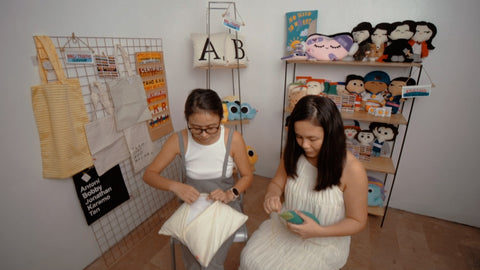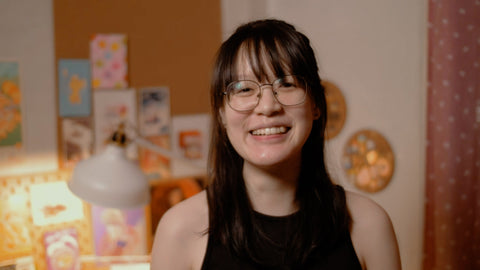Makers to Makers: 7 Tips To Turn Your Art into a Thriving Business
Roma Agsalud-Agsunod and Maan Agsalud knew that when they started Popjunklove–making handmade, upcycled plushies and toys 15 years ago–it wasn’t going to be easy. Neither of them had business degrees nor a substantial capital to get started. The sisters only had that unwavering determination that they really needed to make Popjunklove work as they were the breadwinners of the family.
Many years and hundreds of bazaars later, they were able to build Common Room, a permanent space for them and fellow makers to sell their locally made goods. It’s tempting to think that after they were able to set it up it was smooth sailing and Roma and Maan were already living the dream life fit for a social media feed.

But for them and other makers behind Haebi, Nyuki, and Glourious Dias, they needed to learn many lessons (and continue to learn) to turn their own creations into the thriving businesses that they are now. We’ve gathered here some of their best advice to fellow makers and creative entrepreneurs on how to find success.
1. MANAGE YOUR EXPECTATIONS.
You’ve taken the leap, you think you’ve done the hard part. Not to be a wet blanket here, but as Roma and Maan will attest, there’ll be hardships in every stage as an entrepreneur. “It doesn’t really go away, it just changes over time. First, it was how to start. After a while, it was more of how to expand, then setting up a new store, handling your staff… Over time nag-iiba yung challenges. Every phase [there’s a new] learning curve and we need to adapt to it. Hindi siya nawawala,” says Maan.
Roma believes that this mindset will help makers and small businesses who are just starting not to take the hardships personally. “They think it’s because they’re not good enough and dumarating sa point na they want to give up because they didn’t know it was going to be this hard. We always tell them, it took us almost 10 years before we were able to build Common Room–ganun siya katagal, ganun siya kahirap.”

2. START SMALL.
Making mistakes is part of the process of setting up and growing your business, but mistakes can be costly. For Roma, it’s really important to start small, especially if you don’t have any business background or financial backing. “You don’t know if the business will do well so bakit mo isasangla yung bahay mo for it? You start small so the mistakes will be small as well and then you learn from those mistakes, and then you get better; you make new mistakes and then pagaling ka na lang ng pagaling. Laging may mistakes, but always dun sa level kung nasaan ka, mistakes that you can actually afford.”

3. KNOW WHERE TO GO FOR FINANCIAL SUPPORT.
A lot of small businesses begin just with one’s own savings. That’s how it was for Roma and Maan to get Popjunklove and Common Room started and keep it going. ”Pinaiikot lang namin yung money.” And when they needed more resources, the sisters took out loans. By the second year of the pandemic though, even that wasn’t enough. The sisters explain that they needed to utilize the branding of Common Room, consulted friends with the investment package they worked on, and made the jump to approach investors.
For Hannah Armada, who makes cute enamel pins under her brand Studio Haebi, she borrowed money from her dad as capital to get started. And after she remade two of her original characters, she then considered making more. In her Meet the Maker interview, she revealed that she took the crowdsourcing route. She began with Kickstarter because she couldn’t self-fund it. Afterward, she did Indiegogo. “I was able to make a set, from that set, I made another set then I went back to Kickstarter for a bigger series.” She gained more funds for a bigger set until she was able to create one composed of 22 character.

4. THERE’S ALWAYS MORE WORK TO BE DONE.
When you’re creating your own work–whether they be cute plushies, enamel pins, or fashion pieces–it’s best to remember that work doesn’t end there. Especially as a small business, you end up doing everything in the beginning. “It’s not just making something then that’s it,” Hannah explains. “There’s customer service, social media, sales, marketing, and advertising. You have to do everything.” The great thing about this, at least at the start, is that you get immersed into how other parts of the business works, until eventually…

Check out Studio Haebi’s products
5….YOU DON’T DO EVERYTHING ON YOUR OWN.
When Nike Nadal-Reyes, owner of Nyuki and Co., was having a hard time balancing the demands of motherhood and creating her handmade crochet jewelry and accessory business, she realized she needed help. She says in her Meet the Maker interview, “If you feel that hiring is an added cost, the truth is that the return is greater.” She and her newly trained staff came up with more products. “We are more productive now because I had more time to design. I actually saved more than [when I was] doing everything on my own.”
It was the same for Roma and Maan. At one point, they were “losing opportunities already because hindi na namin talaga kaya,” they recalled in their own Meet the Maker interview. They couldn’t produce new designs for Popjunklove because they were sewing orders. When they started hiring in-house sewers, they saw that it attracted more opportunities because they were able to handle the demand it created.

6. KNOW WHEN YOU’RE JUST IN A SLUMP.
Another great thing about “being hands-on with your business is you know the ins and outs of it,” says Roma. This means, you know when you’re just in a slump. The reasons the sisters kept pushing themselves was because they had seen the potential of their business, how it was received by people at different bazaars. Maan adds, “Mas nagiging confident ka when you have data–you know what’s working, what’s not working. Data, numbers can help you decide better.”

7. HAVE YOUR OWN COMMUNITY.
Being a small independent business can be extra challenging, especially when business is slow. Jodinand Aguillon, the creative behind vintage fashion brand Glorious Dias, has always appreciated being part of a community. In a Meet the Maker interview, he explained: “One of the things that has kept me going despite everything is the fact that we’ve always been surrounded by other people crazy enough to take the same kind of risk like us during these times. Fail together, succeed together, have that around you so you aren’t alone because it’s really easy as an independent business to feel the bad side of what independence feels like.”

Maan shares the same sentiment. “Ang maganda sa local community of makers, it’s very supportive. You’re going through the same challenges.” Over the years, some of Popjunklove’s strongest allies have been from the crafting community. People they met during bazaars and pop-ups. “Just the idea that you can find support from them, na meron kang puwedeng makausap, there’s comfort in that, or sometimes calling you out kung kailangan mong magising, we have that. It wasn’t a lonely journey.”
–written by Mabel David-Pilar
